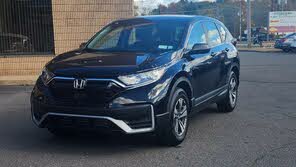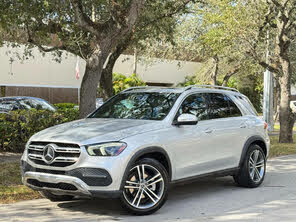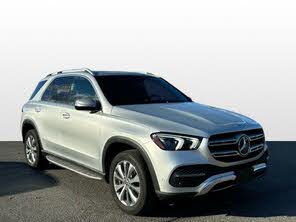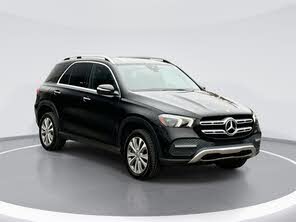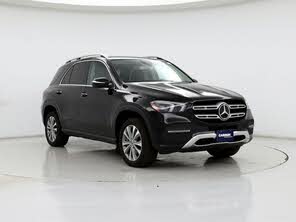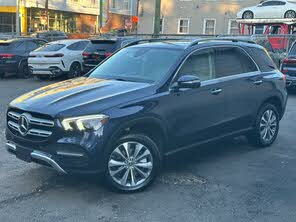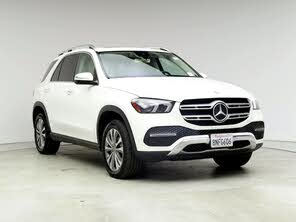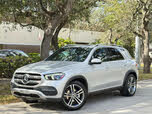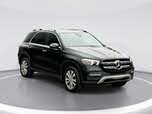2021 Honda CR-V vs 2020 Mercedes-Benz GLE
Overview | |
MSRP$53,700 | MSRP$25,350 |
Average price$35,313 | Average price$25,743 |
Listings860 | Listings1664 |
Ratings & Reviews | |
User Reviews | User Reviews |
Expert reviews6.8 out of 10 | Expert reviews7.8 out of 10 |
Pros
| Pros
|
2020 Mercedes-Benz GLE Reviews SummaryMercedes-Benz refers to the 2020 GLE-Class as a “second-generation model.” But savvy students of car culture will remember that the GLE-Class is actually a renamed M-Class, meaning this is actually a fourth-generation model that’s been in production since 1997. It has a legacy to uphold, and because of that, it’s just as quiet and comfortable as you’d expect. A longer wheelbase means more room inside, and the new MBUX infotainment system may be the best on the market. But this doesn’t mean the GLE-Class is walking away with all the laurels. Sharing a segment with the BMW X5—itself redesigned for 2019—means the GLE-Class is up against some tough competition. And with the usual luxury pricing structure in place, things can get expensive very easily. | |
2021 Honda CR-V Reviews SummaryEven in a grim year, Honda is selling a staggering number of CR-Vs. The CR-V is the best-selling Honda by far. It’s also the second best-selling compact SUV, just behind the Toyota RAV4. And it's the fifth best-selling vehicle in the U.S., and if you take out all the commercial sales of full-size pickups it’s one of the two best-selling vehicles year in and year out. So it’s hard to argue against the CR-V formula. Honda’s been at this almost as long as crossovers have been a thing, launching the CR-V in 1997—a year after the RAV4 debuted. The funny thing is, aside from sales volume, there’s only one thing the CR-V particularly excels at. Aesthetics are subjective, but it would be hard to argue the CR-V is the best looking vehicle in its class. It’s not the cheapest. It’s not the best equipped, especially at the middle to lower trim levels. It’s not the fastest, nor is it the quietest, or the most fuel efficient. It’s not even the most reliable, showing up nowhere in J.D. Power's Most Reliable list. So what makes it so appealing to American consumers? Let’s see if we can figure that out. | |
No video found | No video found |
Popular Features & Specs | |
Engine2.0L 255 hp I4 | Engine1.5L 190 hp I4 |
Drive TrainRWD | Drive TrainFWD |
Seating Capacity7 | Seating Capacity5 |
Horsepower255 hp @ 5800 rpm | Horsepower190 hp @ 5600 rpm |
MPG City20 | MPG City28 |
MPG Highway27 | MPG Highway34 |
Engine | |
Engine Name2.0L 255 hp I4 | Engine Name1.5L 190 hp I4 |
Torque273 lb-ft @ 1800 rpm | Torque179 lb-ft @ 2000 rpm |
Horsepower255 hp @ 5800 rpm | Horsepower190 hp @ 5600 rpm |
DrivetrainRWD | DrivetrainFWD |
Fuel Economy | |
MPG City20 | MPG City28 |
MPG Highway27 | MPG Highway34 |
Interior | |
Seating Capacity7 | Seating Capacity5 |
Key Features | |
Navigation SystemStandard | Navigation System |
Sunroof/MoonroofStandard | Sunroof/Moonroof |
Safety | |
Front Crash Overall | Front Crash Overall5 |
Side Crash Overall | Side Crash Overall5 |
Dimensions & Capacity | |
Cargo Space33.3 cu ft | Cargo Space39.2 cu ft |
Curb Weight4608 lbs | Curb Weight3337 lbs |
Height70.7 in | Height66.1 in |
Length194.3 in | Length182.1 in |
Width84.9 in | Width73.0 in |
Wheelbase117.9 in | Wheelbase104.8 in |
Maximum Payload | Maximum Payload1358 lbs |
Number of doors4 | Number of doors4 |
Maximum Towing Capacity5950 lbs | Maximum Towing Capacity1500 lbs |
Overview | ||
MSRP | $53,700 | $25,350 |
Average price | $35,313 | $25,743 |
Listings | ||
Ratings & Reviews | ||
User reviews | ||
Expert reviews | 6.8 out of 10Read full review | 7.8 out of 10Read full review |
Pros & cons | Pros
| Pros
|
Summary | Mercedes-Benz refers to the 2020 GLE-Class as a “second-generation model.” But savvy students of car culture will remember that the GLE-Class is actually a renamed M-Class, meaning this is actually a fourth-generation model that’s been in production since 1997. It has a legacy to uphold, and because of that, it’s just as quiet and comfortable as you’d expect. A longer wheelbase means more room inside, and the new MBUX infotainment system may be the best on the market. But this doesn’t mean the GLE-Class is walking away with all the laurels. Sharing a segment with the BMW X5—itself redesigned for 2019—means the GLE-Class is up against some tough competition. And with the usual luxury pricing structure in place, things can get expensive very easily. | Even in a grim year, Honda is selling a staggering number of CR-Vs. The CR-V is the best-selling Honda by far. It’s also the second best-selling compact SUV, just behind the Toyota RAV4. And it's the fifth best-selling vehicle in the U.S., and if you take out all the commercial sales of full-size pickups it’s one of the two best-selling vehicles year in and year out. So it’s hard to argue against the CR-V formula. Honda’s been at this almost as long as crossovers have been a thing, launching the CR-V in 1997—a year after the RAV4 debuted. The funny thing is, aside from sales volume, there’s only one thing the CR-V particularly excels at. Aesthetics are subjective, but it would be hard to argue the CR-V is the best looking vehicle in its class. It’s not the cheapest. It’s not the best equipped, especially at the middle to lower trim levels. It’s not the fastest, nor is it the quietest, or the most fuel efficient. It’s not even the most reliable, showing up nowhere in J.D. Power's Most Reliable list. So what makes it so appealing to American consumers? Let’s see if we can figure that out. |
Video | No video found | No video found |
Popular Features & Specs | ||
Engine | 2.0L 255 hp I4 | 1.5L 190 hp I4 |
Drive Train | RWD | FWD |
Seating Capacity | 7 | 5 |
Horsepower | 255 hp @ 5800 rpm | 190 hp @ 5600 rpm |
MPG City | 20 | 28 |
MPG Highway | 27 | 34 |
Engine | ||
Engine Name | 2.0L 255 hp I4 | 1.5L 190 hp I4 |
Torque | 273 lb-ft @ 1800 rpm | 179 lb-ft @ 2000 rpm |
Horsepower | 255 hp @ 5800 rpm | 190 hp @ 5600 rpm |
Drivetrain | RWD | FWD |
Fuel Economy | ||
MPG City | 20 | 28 |
MPG Highway | 27 | 34 |
Interior | ||
Seating Capacity | 7 | 5 |
Key Features | ||
Navigation System | Standard | |
Sunroof/Moonroof | Standard | |
Safety | ||
Front Crash Overall | 5 | |
Side Crash Overall | 5 | |
Dimensions & Capacity | ||
Cargo Space | 33.3 cu ft | 39.2 cu ft |
Curb Weight | 4608 lbs | 3337 lbs |
Height | 70.7 in | 66.1 in |
Length | 194.3 in | 182.1 in |
Width | 84.9 in | 73.0 in |
Wheelbase | 117.9 in | 104.8 in |
Maximum Payload | 1358 lbs | |
Number of doors | 4 | 4 |
Maximum Towing Capacity | 5950 lbs | 1500 lbs |
The 2020 Mercedes-Benz GLE presented a smoother and less sculpted design compared to its predecessors, with softened lines and removed edges and scalloping. This redesign contributed to a reduced drag coefficient from .32 to .29, making it a class leader according to Mercedes. The most noticeable change was the front end, which offered a handsome, if unoffensive, appearance. Inside, the GLE provided extra headroom and legroom due to a 3.1-inch extended wheelbase, and for the first time, an optional third row was available. However, the $720 Emerald Green Metallic paint showed a surprising amount of orange-peel effect, which was disappointing for a premium vehicle.
The GLE 350 started at $53,700, featuring a 2.0-liter turbocharged engine with 255 horsepower and 273 pound-feet of torque. Adding the 4Matic all-wheel-drive system cost an additional $2,500. The price escalated quickly with various options, such as black leather upholstery for $1,620, a cabin air purifier and fragrance system for $350, and multi-contour front seats with a massage feature for $1,100. Despite the luxurious features, some options like heated and cooled cupholders for $180 and soft-close doors for $550 seemed excessive. The total cost of the test vehicle, including a $995 Delivery & Destination fee, was $78,370.
The 2021 Honda CR-V, on the other hand, had a design that blended in with other compact crossovers, with few distinguishing features like the grille opening and some chromed plastic elements. The CR-V was available in eight colors, but most were shades of gray, black, or white, with only two vibrant options: Obsidian Blue Pearl and Radiant Red Metallic. The interior offered black, gray, and ivory cloth or leather, depending on the trim level, with wood panels and more chrome available on higher trims. The CR-V's design was more modern compared to some competitors, but vehicles like the Kia Sportage and Hyundai Tucson offered more distinctive styling.
The 2020 Mercedes-Benz GLE 350 featured a turbocharged 2.0-liter 4-cylinder engine with 255 horsepower and 273 pound-feet of torque. While it provided ample power at speed, it felt sluggish from a stop due to turbo lag and the vehicle's nearly 5,000-pound weight. The 9-speed automatic transmission was decent but not as smooth as the 8-speed in the BMW X5. The GLE 350 4Matic's fuel economy was impressive, with 19 mpg city, 26 highway, and 22 combined, but the BMW X5 offered more power and slightly better city mileage.
The 2021 Honda CR-V came with a 190-horsepower turbocharged four-cylinder engine across all nine trims. It accelerated from 0 to 60 mph in about 7.8 seconds, which was competitive within its class. The CR-V's continuously variable transmission (CVT) provided smooth and steady acceleration but lacked engagement compared to the conventional eight-speed automatics in competitors like the Kia Sportage and Hyundai Tucson. The CR-V offered front-wheel drive as standard, with all-wheel drive available as an option. Its suspension setup included a MacPherson strut front and multi-link rear, providing decent handling and ride quality.
The 2020 Mercedes-Benz GLE's extended wheelbase provided significant interior space, especially in the second row. It offered between 33.3 and 39.3 cubic feet of cargo space behind the second row, expanding to 79.4 cubic feet with the seats lowered. The interior featured dual 12.3-inch screens, setting a new standard for dash design and customizability. The seats were comfortable, with a "Seat Kinetics" system to prevent cramping, though the lumbar support was tricky to adjust. The steering wheel felt great but often blocked parts of the screen, and the upgraded Burmester stereo provided excellent sound, albeit with some vibration issues.
The 2021 Honda CR-V focused on functionality, offering 102.9 cubic feet of passenger volume and 75.8 cubic feet of cargo space with the rear seats folded. The tailgate options varied by trim, with the Touring trim featuring a hands-free power tailgate. Roof rails were standard only on the top Touring trim. The CR-V's interior was designed to fit five people comfortably and carry their gear, making it a practical choice for families.
The 2020 Mercedes-Benz GLE featured the new MBUX infotainment system with dual 12.3-inch screens and a head-up display (HUD). The system included augmented reality for navigation and natural voice control, though the latter had issues in the pre-production model tested. The driver-assistance tech was better than BMW's but still had room for improvement, especially at high speeds.
The 2021 Honda CR-V's base LX trim had a 5-inch color screen with Bluetooth, while other trims featured a 7-inch high-definition touchscreen with Apple CarPlay and Android Auto. The audio system varied by trim, with the Touring trim offering a 300-watt system with a subwoofer. Charging ports were plentiful, with the Touring trim adding a wireless phone charger.
The 2020 Mercedes-Benz GLE had no current testing data from NHTSA or IIHS but offered a suite of autonomous safety systems, including Attention Assist and Seat Kinetics. However, the lane-keeping system was less effective at high speeds, making it frustrating to use.
The 2021 Honda CR-V excelled in safety, earning a five-star NHTSA rating and an IIHS Top Safety Pick award. It featured the Honda Sensing system, which included forward collision warning, lane departure warning, automatic emergency braking, and more, all standard across all trims except for blind spot monitoring, which was standard from the EX trim upwards.
CarGurus highlights

According to CarGurus experts, the overall rating for the 2020 Mercedes-Benz GLE is 6.8 out of 10, while the 2021 Honda CR-V scores 7.8 out of 10. Based on these ratings, the 2021 Honda CR-V is the better choice, offering superior safety, practicality, and value for money.
Choose the 2021 Honda CR-V if:
- You value safety and want advanced safety features standard across all trims.
- You need a practical and spacious vehicle for family and cargo.
- You prefer a more affordable and fuel-efficient option.
Choose the 2020 Mercedes-Benz GLE if:
- You prioritize luxury features and a high-end interior.
- You want advanced technology with dual 12.3-inch screens and a comprehensive HUD.
- You need a spacious second row and optional third-row seating.
CarGurus highlights

According to CarGurus experts, the overall rating for the 2020 Mercedes-Benz GLE is 6.8 out of 10, while the 2021 Honda CR-V scores 7.8 out of 10. Based on these ratings, the 2021 Honda CR-V is the better choice, offering superior safety, practicality, and value for money.
Choose the 2021 Honda CR-V if:
Shop Now- You value safety and want advanced safety features standard across all trims.
- You need a practical and spacious vehicle for family and cargo.
- You prefer a more affordable and fuel-efficient option.
Choose the 2020 Mercedes-Benz GLE if:
Shop Now- You prioritize luxury features and a high-end interior.
- You want advanced technology with dual 12.3-inch screens and a comprehensive HUD.
- You need a spacious second row and optional third-row seating.

By: CarGurus + AI
At CarGurus, our team of experienced automotive writers remain at the heart of our content operation, conducting hands-on car tests and writing insightful guides that are backed by years of industry experience. To complement this, we are harnessing AI to make our content offering more diverse and more helpful to shoppers than ever. To achieve this, our AI systems are based exclusively on CarGurus content, ratings and data, so that what we produce is both unique to CarGurus, and uniquely helpful to car shoppers.













